Understanding the Intersection of ADHD and Alcohol Consumption
The relationship between Attention Deficit Hyperactivity Disorder (ADHD) and alcohol use is intricate, with research consistently revealing a heightened risk of alcohol misuse among individuals with ADHD. This article explores how ADHD influences alcohol consumption patterns, the effects of alcohol on ADHD symptoms, and the medical and psychological implications of their co-occurrence. Through scientific studies and clinical insights, we aim to provide a comprehensive understanding of this important public health issue, emphasizing the importance of integrated treatment approaches and early intervention.
The Link Between ADHD and Alcohol Use
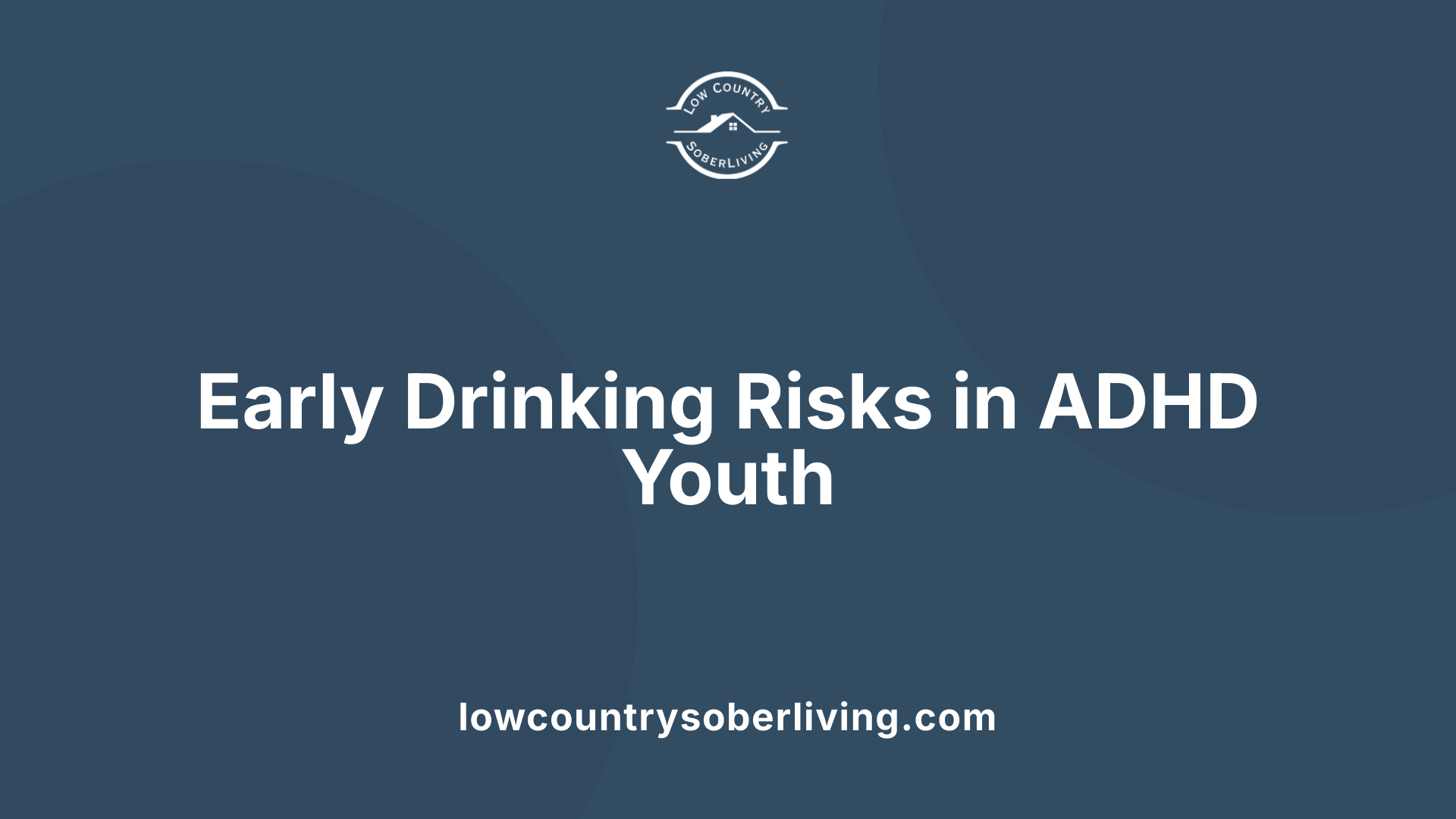
What is the relationship between ADHD and alcohol use?
Individuals with Attention Deficit Hyperactivity Disorder (ADHD) are at a notably higher risk of developing alcohol use disorder (AUD). Research indicates that about 43% of those with ADHD may be susceptible to problematic alcohol behaviors. Many start drinking at an earlier age compared to their peers, often engaging in binge drinking during adolescence and early adulthood.
This increased vulnerability stems from various behavioral and neurological factors. Traits such as impulsivity and sensation-seeking common in ADHD make individuals more likely to engage in risky drinking behaviors. Self-medicating to manage symptoms like anxiety, restlessness, or impulsiveness also plays a role.
Alcohol consumption can worsen pre-existing ADHD symptoms, such as inattentiveness and impulsivity, while also increasing the risk of serious health issues including liver disease, cardiovascular problems, and neurological damage. Moreover, alcohol's interaction with ADHD medications, particularly stimulants like Adderall and Ritalin, may lead to adverse side effects that complicate treatment.
The neurobiological link involves the impact of alcohol on the brain's frontal lobes—areas also affected by ADHD—further impairing decision-making, impulse control, and emotional regulation. Behavioral tendencies such as early initiation, binge drinking, and propensity for self-medication contribute to the complex relationship between ADHD and alcohol use.
Understanding this relationship underscores the need for coordinated diagnosis and integrated treatment strategies. Combining behavioral therapies with medication management and education on alcohol risks can help reduce adverse outcomes, improve the quality of life, and support long-term recovery for individuals with ADHD.
Effects of Alcohol on Individuals with ADHD
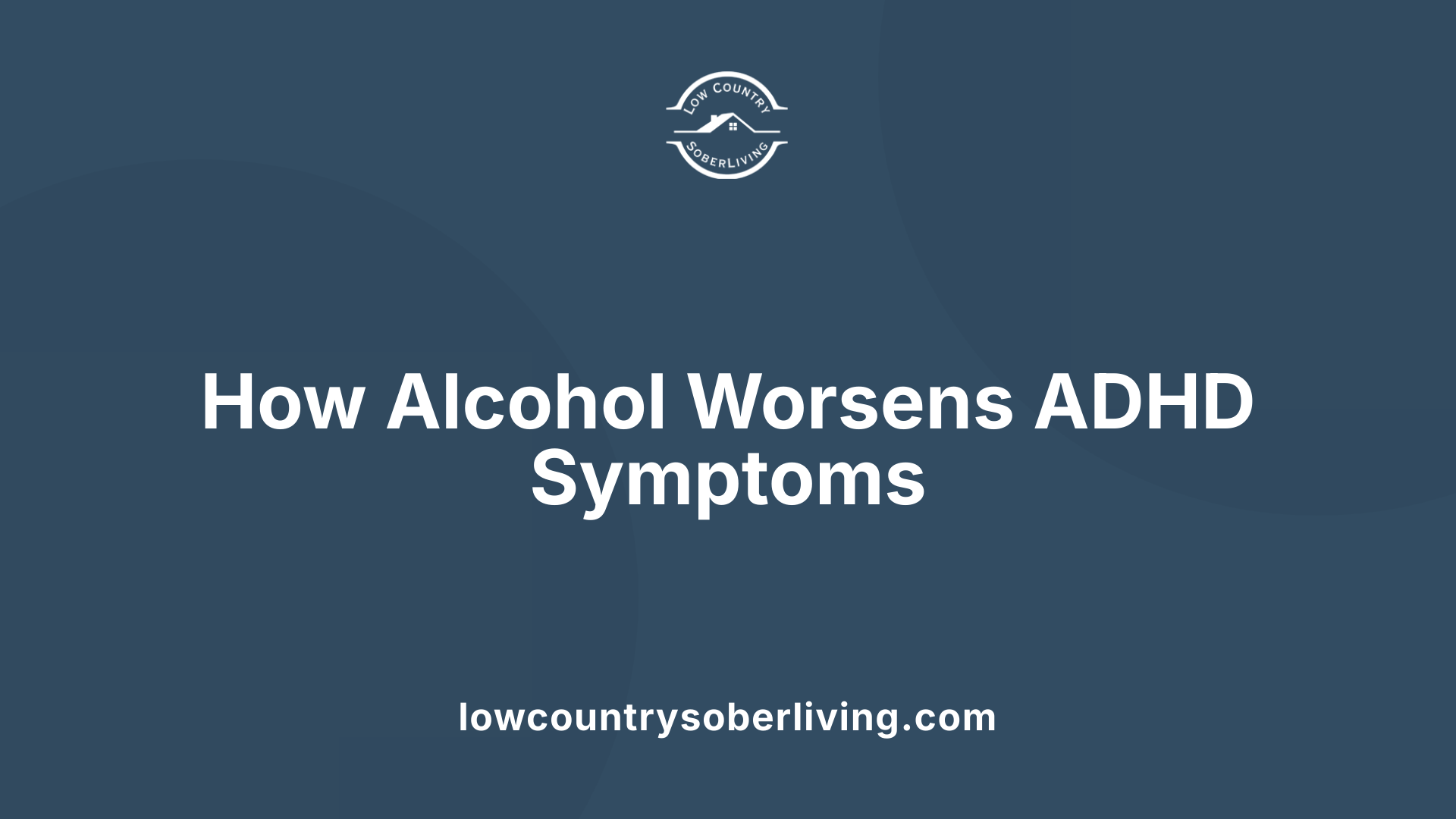
How does alcohol affect individuals with ADHD?
Alcohol can have a profound negative impact on individuals with ADHD. It tends to worsen core symptoms such as impulsivity, inattentiveness, and hyperactivity, both during use and in the long term. Because many people with ADHD are naturally more impulsive and sensation-seeking, they are more prone to heavy or binge drinking and are at a higher risk of developing alcohol use disorder.
Research indicates that alcohol impairs inhibitory control, which can increase risky behaviors like reckless driving, unsafe sex, or other dangerous activities. This impairment is particularly concerning for individuals with ADHD, who already struggle with self-regulation. Short-term effects include worsened focus and attention, along with increased impulsivity and emotional instability.
Furthermore, alcohol interacts negatively with ADHD medications, especially stimulant types such as Adderall and Ritalin. These interactions can heighten side effects like increased heart rate and blood pressure, or reduce the effectiveness of the medication, leading to poorly managed ADHD symptoms.
Many with ADHD may turn to alcohol as a form of self-medication to alleviate feelings of anxiety or restlessness. However, this often backfires, intensifying the mental health challenges and creating a cycle of dependency. The combined neurobiological impacts of alcohol and ADHD can impair cognition, including memory and decision-making, which are already areas of difficulty.
People with ADHD are also more sensitive to alcohol's effects, experiencing greater behavioral and cognitive impairments at lower doses compared to those without ADHD. As a result, alcohol can undo progress made through treatment, worsen mental health, and increase the likelihood of adverse health outcomes such as liver disease, neurological issues, and increased cancer risk.
Given these risks, individuals with ADHD should exercise caution with alcohol consumption. Consulting healthcare professionals for guidance is highly recommended to safely manage ADHD symptoms and reduce health risks associated with alcohol use.
| Aspect | Effect | Additional Info |
|---|---|---|
| Impulsivity | Increases significantly | Heightened risk of risky behaviors |
| Cognitive Function | Impairment in memory and decision-making | Worsens existing ADHD-related challenges |
| Sensitivity | Higher sensitivity at lower doses | Greater behavioral and cognitive impairments |
| Medication Interaction | Negative effects, reduced efficacy | Especially with stimulants |
| Long-term Risks | Increased addiction, health issues | Liver disease, neurological damage |
Understanding the complex interactions between alcohol and ADHD can inform safer choices and better management strategies for affected individuals.
Medication Interactions and Safety Concerns
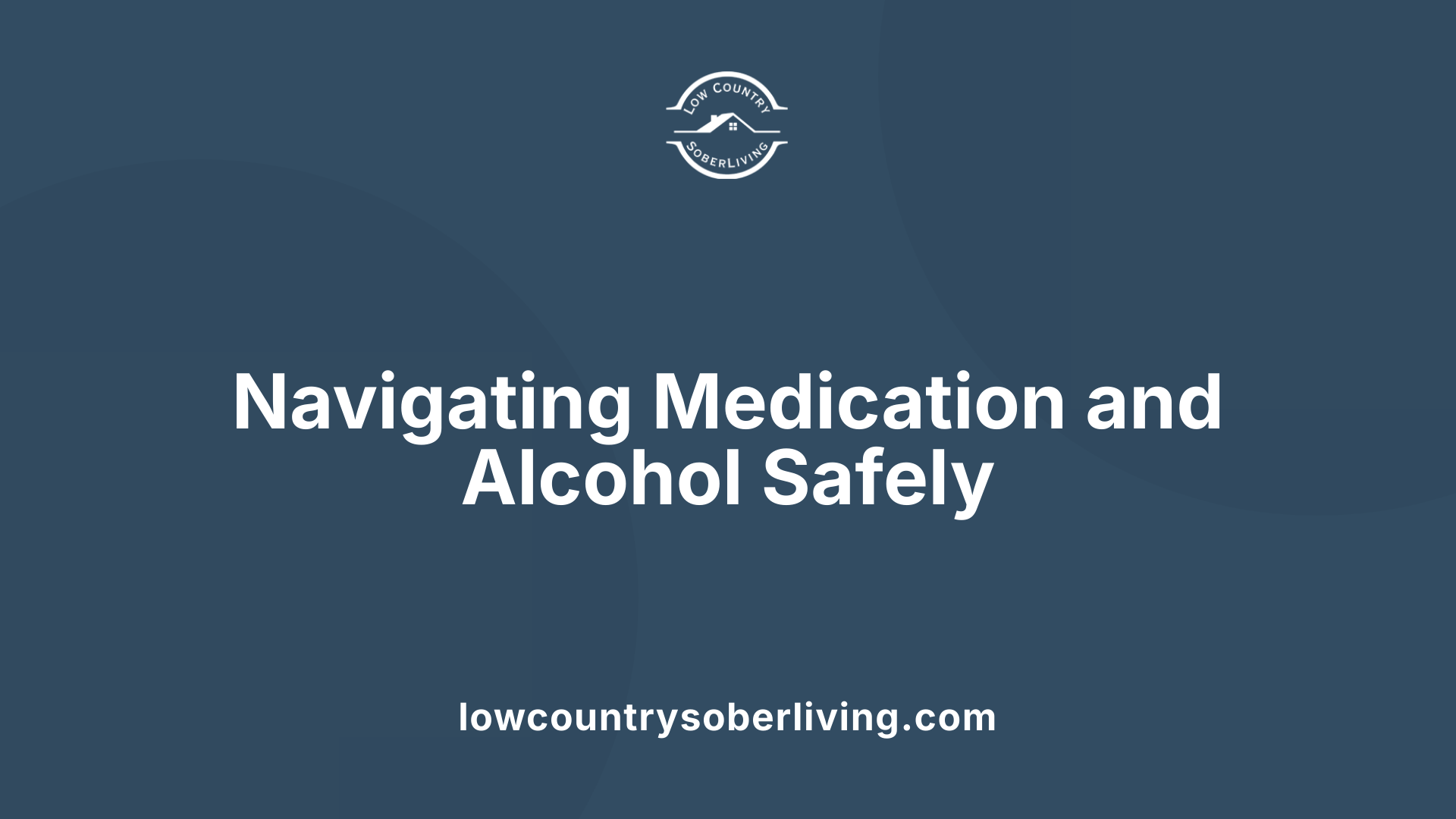
What are the potential medication interactions between ADHD treatments and alcohol?
Medications used for ADHD, whether stimulants like Adderall and Ritalin or non-stimulants such as atomoxetine and guanfacine, can interact with alcohol in harmful ways. Combining these medications with alcohol can lead to a range of serious health effects.
Stimulant medications are designed to boost dopamine and noradrenaline levels to improve focus and reduce hyperactivity. When alcohol is consumed alongside stimulants, it can counteract or mask some of the medication’s effects, increasing the risk of overdose and leading to dangerous behaviors. For example, alcohol can cause increased heart rate, high blood pressure, impaired judgment, and dizziness, which are compounded by stimulant effects.
Similarly, non-stimulant drugs like clonidine and guanfacine, which are often prescribed to help regulate blood pressure and reduce impulsivity, can cause significant CNS depression when mixed with alcohol. This combination can lead to severe drowsiness, dizziness, or even loss of consciousness.
The interaction between alcohol and atomoxetine (Strattera) is less well understood but still warrants caution. Alcohol may increase side effects such as increased heart rate or blood pressure, and this combination might impair cognitive functions or exacerbate side effects like sleep disturbances.
Risks of overdose, cardiovascular issues, and diminished medication efficacy
Mixing alcohol with ADHD medications can increase the risk of overdose, especially with long-acting formulations. Excessive consumption can strain the heart, leading to arrhythmias, hypertension, or even heart attack.
Moreover, alcohol can diminish the therapeutic effects of ADHD medications, making symptoms harder to control. Over time, this can lead to poor management of ADHD, worsening of symptoms like impulsivity and inattention, and increased reliance on alcohol to self-medicate.
There’s also a risk of developing alcohol dependence and addiction due to the impulsivity and sensation-seeking behaviors associated with ADHD.
Medical guidance and precautions for patients
Patients on ADHD medications should avoid alcohol unless explicitly advised otherwise by their healthcare provider. It’s essential to discuss any alcohol use during consultations so that personalized guidance can be provided.
Healthcare professionals may recommend strategies such as abstinence, monitoring for side effects, and adjusting medication dosages if necessary. Patients should be educated about the signs of adverse effects and encouraged to seek immediate medical help if they experience symptoms like chest pain, severe dizziness, or rapid heartbeat.
Overall, careful management and open communication with healthcare providers are critical to safely navigating treatment of ADHD alongside alcohol use. Proper adherence to medical advice can prevent serious health complications and improve long-term outcomes.
Health Risks and Long-Term Consequences
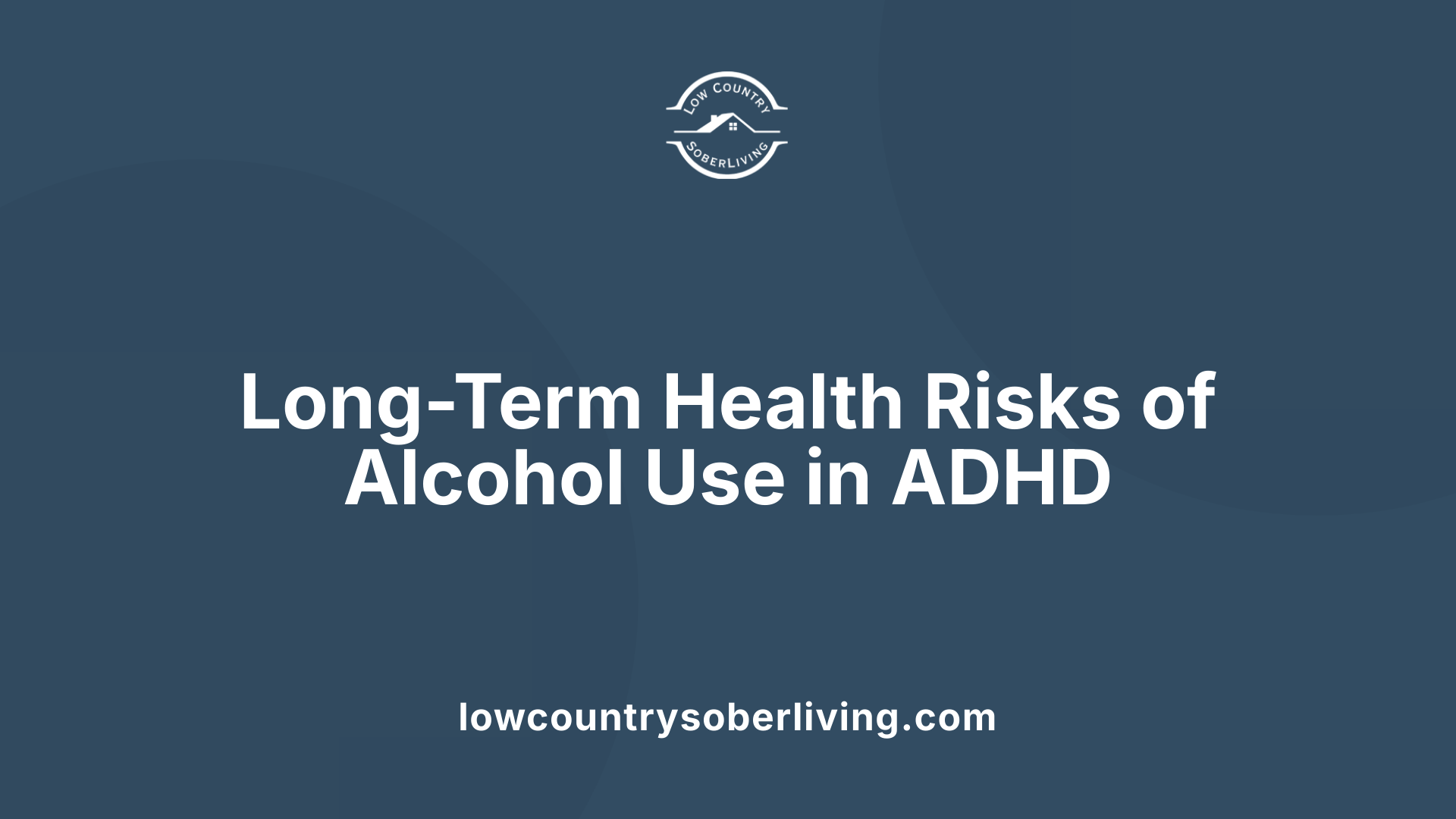
What are the risks and health implications of co-occurring ADHD and alcohol use?
Individuals with ADHD who also use alcohol face a range of serious health hazards. Research shows that about 43% of people with ADHD are at risk of developing alcohol use disorder (AUD). Their impulsive nature and tendency toward sensation-seeking behaviors often lead to early initiation of alcohol consumption, heavy or binge drinking, and ongoing problematic use.
The combination of ADHD and alcohol not only worsens behavioral symptoms such as impulsivity and inattention but also increases the risk of accidents, injuries, and safety concerns. Alcohol can impair cognitive functions further, making decision-making more difficult and intensifying emotional dysregulation.
Another significant risk stems from alcohol's interaction with ADHD medications, especially stimulants like Adderall and Ritalin. These interactions can elevate the risk of side effects such as high blood pressure, irregular heartbeats, and seizures, posing direct health threats.
Long-term alcohol abuse in individuals with ADHD can lead to severe health problems including liver disease, neurological impairments, and cardiovascular issues such as increased heart disease risk. People with untreated ADHD and alcohol misuse often have poorer treatment outcomes, higher relapse rates, and face more complex recovery challenges.
Beyond physical health, these overlapping conditions can influence mental health, increasing the likelihood of depression, anxiety, and other mood disorders. Overall, the interplay between ADHD and alcohol use complicates health management, heightens health risks, and hampers effective treatment, emphasizing the need for comprehensive, integrated care approaches.
Mental Health and Behavioral Factors
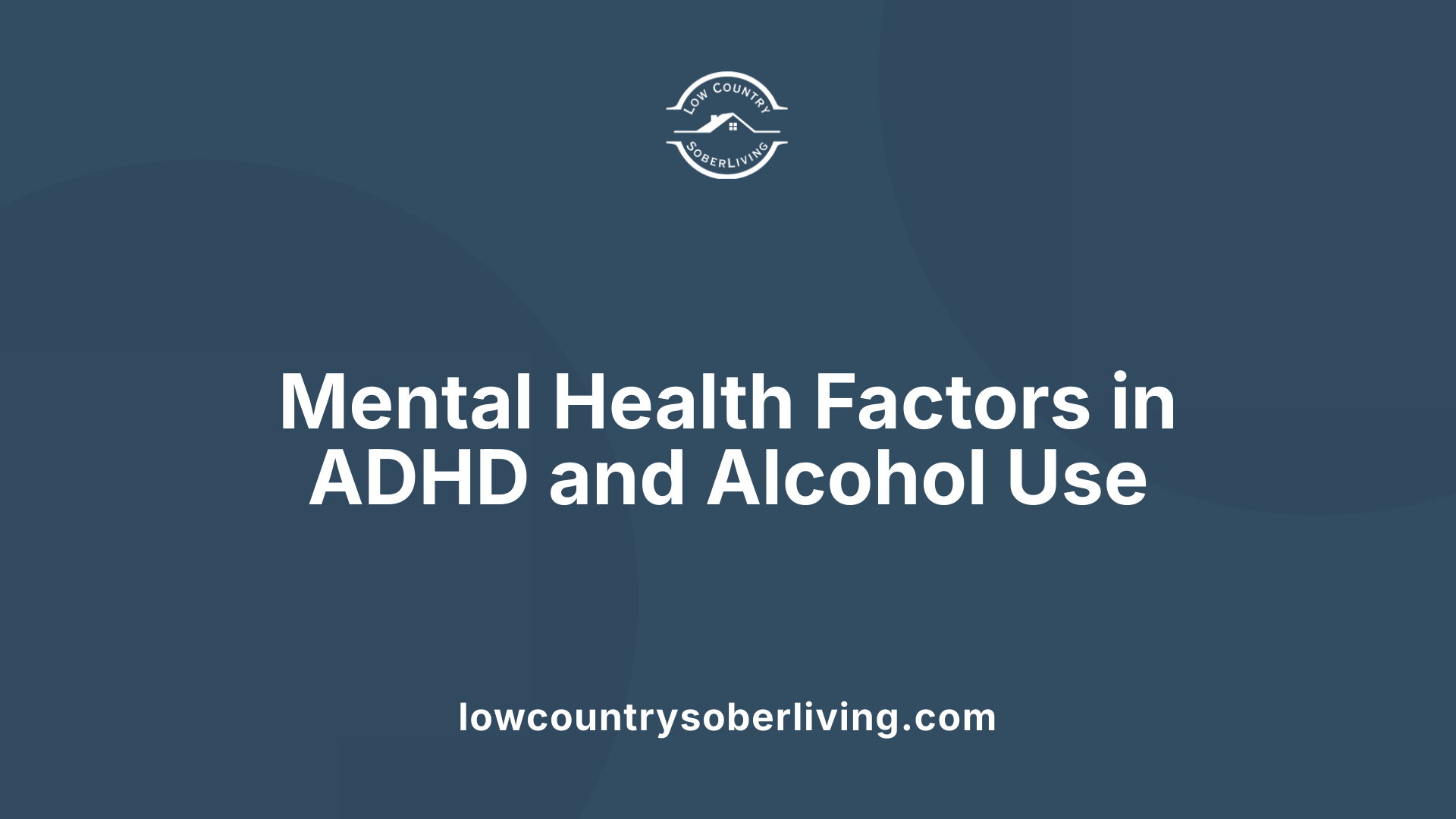
What mental health factors are related to ADHD and alcohol use?
Individuals with ADHD often face co-occurring mental health conditions that can increase their vulnerability to alcohol misuse. Conditions such as depression, anxiety, conduct disorder, and antisocial personality disorder are common among this population. These disorders can lead to increased stress, emotional distress, and poor coping strategies, making alcohol a tempting form of self-medication.
Impulsivity and heightened reward-seeking behaviors are hallmark traits of ADHD, largely due to dopamine system dysregulation. These traits not only contribute to early initiation of alcohol use but also to a tendency toward heavy and binge drinking. This impulsiveness makes individuals more prone to risky behaviors, including substance misuse.
Moreover, ADHD can impair social, academic, and vocational functioning. Struggling in these areas may cause feelings of frustration or low self-esteem, which can mediate a higher tendency to turn to alcohol as a way to manage negative emotions or cope with daily stressors.
On a neurobiological level, overlapping pathways in the brain’s impulse control and reward systems underline the connection between ADHD and alcohol use. Shared genetic factors may influence both conditions, especially genes involved in dopamine regulation. Brain structures such as the prefrontal cortex, which governs decision-making and impulse control, are affected in both ADHD and alcohol dependence.
Addressing these mental health issues, along with understanding the neurobiological vulnerabilities, is vital for preventing alcohol misuse in individuals with ADHD. Integrated treatment approaches that target both mental health and behavioral regulation can improve outcomes and reduce the risk of long-term substance use problems.
Behavioral Patterns and Self-Medication Risks
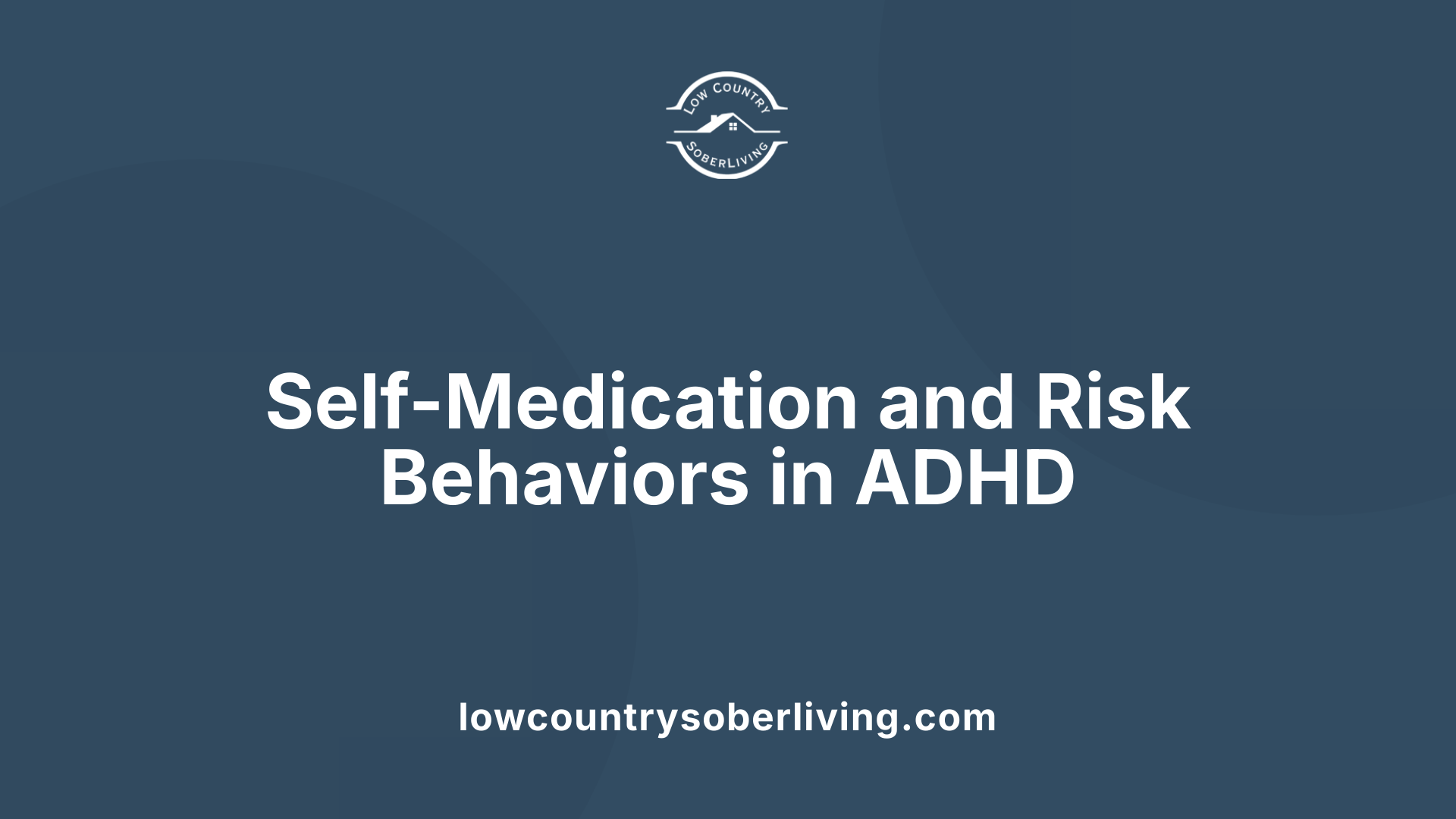
How do individuals with ADHD use alcohol to manage their symptoms?
Many people with ADHD turn to alcohol as a form of self-medication to control symptoms like hyperactivity, anxiety, or restlessness. The temporary calming effects of alcohol may seem to provide relief, but in reality, alcohol often worsens core symptoms of ADHD over time. It impairs cognitive functions involved in attention, decision-making, and impulse control, making existing symptoms more severe.
Alcohol floods the brain with chemicals such as dopamine, which can give a fleeting sense of pleasure or relief. However, this short-term benefit masks long-term risks. When alcohol interacts with ADHD medications, especially stimulants like Adderall or Ritalin, the risk of side effects such as increased heart rate, high blood pressure, and sleep disturbances rises. Over time, reliance on alcohol can develop into a pattern of problematic use.
What is the pattern of early initiation and escalation to problematic use?
Children and adolescents with ADHD are more likely to start drinking alcohol earlier than their peers. Studies show that by age 14, a significant percentage of children with ADHD have already begun alcohol consumption, often progressing quickly to heavy or binge drinking.
Early initiation increases the chances of developing alcohol use disorder (AUD) in adulthood. The impulsivity and sensation-seeking traits typical of ADHD contribute to this pattern. Many teens use alcohol to alleviate feelings of restlessness or social anxiety, but this inevitably leads to escalation, with some developing dependence. Continued heavy drinking amplifies the risk of serious health issues, including liver disease, neurological damage, and increased cancer risk.
How does impulsivity influence risky behaviors?
Impulsivity is a hallmark of ADHD and drives many risky behaviors linked to alcohol use. These include risky sexual activity, unsafe driving, and engaging in dangerous situations while intoxicated. The lowered inhibitions caused by alcohol further impair judgment, leading to potentially hazardous outcomes.
The combination of impulsivity and alcohol's disinhibiting effects creates a cycle where individuals with ADHD may repeatedly engage in risky behaviors without fully considering consequences. This cycle increases the likelihood of accidents, injuries, legal problems, and social issues.
Signs of alcohol abuse in individuals with ADHD?
Recognizing alcohol abuse in those with ADHD involves looking for certain signs. These include increased impulsivity, risky behaviors such as unsafe sex or reckless driving, neglecting personal and professional responsibilities like work, school, or family obligations.
Persistent alcohol use despite negative health impacts, such as liver problems or cardiovascular issues, signals problematic behaviors. These individuals may also experience a worsening of ADHD symptoms, with greater inattentiveness and hyperactivity, as alcohol impairs brain functions.
Physical signs like slurred speech, impaired coordination, and neglect of hygiene can also indicate abuse. Because ADHD may mask or complicate the recognition of these signs, careful monitoring and early intervention are essential to prevent escalation into severe addiction or health complications.
Importance of Early Intervention and Integrated Treatment
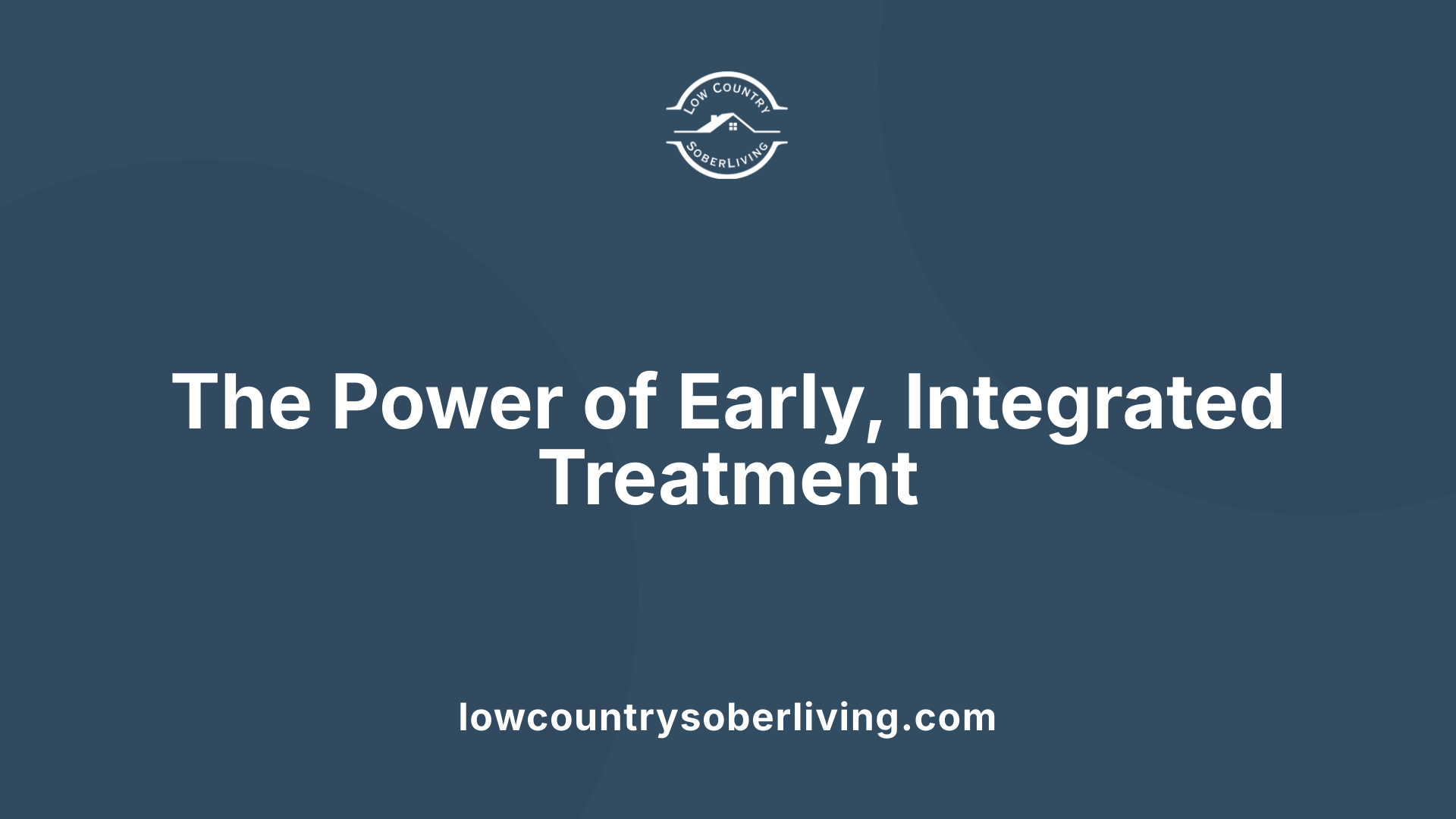
What are the treatment options for managing ADHD and alcohol use disorder?
Effectively managing both ADHD and alcohol use disorder (AUD) involves a coordinated, comprehensive approach that targets each condition simultaneously. The primary treatment options include medications and therapeutic interventions designed to address underlying symptoms and behavioral patterns.
For medication, clinicians often prescribe long-acting stimulants such as methylphenidate or amphetamines, which provide prolonged symptom control while reducing abuse potential. Non-stimulant options, like atomoxetine or guanfacine, are also considered safer alternatives, especially when combined with support for substance recovery. These medications should always be used under close medical supervision to avoid adverse interactions, particularly with alcohol.
Behavioral therapies standardly applied include cognitive-behavioral therapy (CBT), which helps individuals develop coping strategies, manage impulsivity, and address negative patterns of thought that contribute to drinking. Support groups, inpatient or outpatient programs, and individualized counseling bolster ongoing recovery efforts.
Routine screening is crucial because ADHD symptoms are often overlooked in patients presenting with AUD. Early diagnosis enables prompt treatment, improving long-term outcomes. Concurrent treatment that addresses both disorders helps enhance engagement, reduce the risk of relapse, and improve quality of life.
Integrating medical management with psychosocial support creates a robust framework for recovery, emphasizing the importance of a tailored, multidisciplinary approach. This comprehensive care reduces hospitalization risks, helps prevent severe health consequences like liver disease or neurological impairments, and supports sustained abstinence and symptom management.
How does early intervention impact recovery?
Early diagnosis and intervention are vital because they prevent the escalation of symptoms and reduce the likelihood of developing severe health problems. Addressing ADHD and alcohol misuse promptly can improve cognitive, emotional, and behavioral functioning, thus fostering better social, academic, and occupational outcomes over time.
Scientific Insights and Future Directions
Research has revealed that the interplay between ADHD and alcohol involves complex neurobiological and genetic factors. Individuals with ADHD often exhibit dysregulation in the dopaminergic pathways, which are crucial for reward processing and impulse control. This neurochemical imbalance can predispose them to seek out substances like alcohol as a form of self-medication or to enhance reward sensations. Genetic studies suggest shared familial and biological links, particularly involving genes related to dopamine regulation, which may increase vulnerability to both ADHD and substance use disorders alike.
Emerging research has focused on understanding the mechanisms that connect these conditions. For example, impairments in executive functions—such as decision-making, impulse control, and emotional regulation—are common in ADHD and can be exacerbated by alcohol consumption. Longitudinal studies tracking individuals over time show that untreated ADHD increases the likelihood of early alcohol use and problematic drinking patterns in adulthood. Experimental investigations, including functional imaging and neuropsychological tests, have also demonstrated that alcohol further impairs the prefrontal cortex in those with ADHD, leading to difficulty in inhibiting impulses and managing emotions.
Prompt intervention strategies are gaining attention as promising approaches. Early screening for ADHD in children and adolescents, coupled with tailored treatments like medication, behavioral therapy, and psychoeducation, can reduce the risk of developing alcohol use disorder later on. Personalized medicine approaches that consider genetic, neurobiological, and psychological profiles hold potential for optimizing treatment efficacy and reducing harmful behaviors. Additionally, integrated treatment programs that simultaneously address ADHD symptoms and substance use offer improved outcomes and higher retention rates.
Ongoing studies are vital for uncovering novel intervention techniques. For example, research into neurofeedback, cognitive training, and emotion regulation therapies aims to strengthen executive functions and resilience against substance misuse. As understanding deepens, future research might focus on biomarkers for risk assessment, preventive strategies for at-risk youth, and innovative pharmacological agents to better manage co-occurring ADHD and alcohol dependence.
In summary, the evolving scientific landscape underscores the importance of early detection, customized treatment plans, and continuous research efforts. These initiatives are essential for mitigating the adverse impacts of alcohol on individuals with ADHD and for developing targeted interventions that can improve quality of life and long-term outcomes.
Towards Better Management and Prevention
The co-occurrence of ADHD and alcohol use presents complex challenges but also opportunities for targeted intervention, early diagnosis, and integrated treatment strategies. Advances in scientific research deepen our understanding of the neurobiological and behavioral mechanisms at play, emphasizing the importance of comprehensive screening and personalized care. Addressing mental health comorbidities, promoting abstinence, and utilizing behavioral therapies can significantly improve recovery outcomes. Public health initiatives and clinical practices must continue to evolve to mitigate the risks associated with this interplay, ultimately enhancing the quality of life for individuals with ADHD and reducing the burden of alcohol-related health problems.
References
- Alcohol and ADHD: How They're Linked | Gateway Foundation
- ADHD and alcohol: Emotional regulation efforts pay off in quality of ...
- How Alcohol Affects Those with ADHD - Healthline
- How Alcohol Abuse Affects ADHD
- Increased Sensitivity to the Disinhibiting Effects of Alcohol in Adults ...
- When you mix alcohol and ADHD | Alcohol Change UK
- ADHD and Alcohol: The Risks of Drinking With This Disorder
- Treating ADHD in Patients With Alcohol Use Disorder
- ADHD and alcohol: effects and signs of abuse - Priory Group
- Adult symptoms of ASD and ADHD in relation to alcohol use

